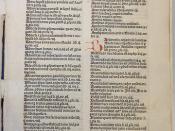Boethius' Argument Against Universals In the essay "From His Second Commentary on Porphyry's Isagoge" Boethius discusses the existence of universals.. By proposing two main arguments, he first shows why a view such as that held by Plato (one claiming that universals exist independent of particulars and that a universal exists wholly in each particular at all times) is false. Then he presents his own view of the relationship between universals and particulars which is based on the idea that the universals exist in the collectivity of the particulars.
Boethius' first argument against a Platonic view of universals concerns how a single universal can exist wholly and entirely in each particular thing to which it is common. A universal is supposedly one entity existing in every particular to which it is common at all times. But Boethius argues that if it is to exist wholly in several things at one time, it cannot in itself be one entity.
According to Boethius "everything that exists exists for the reason that it is one." And therefore, if the universal is existing in several things at one time (and thus is not one in number) then it cannot exist in this Platonic fashion.
Boethius' second argument deals with universals if they are to be spoken of as being many rather than one. He explains that to say is also false. For to say this is to imply that "there will be no last (universal set above the others)." This is because there will be a universal set over many things and will thus be multiple. And because it is in many things, it "has a likeness of what is a (universal)." But it is a likeness that is not one in number and therefore, "another (universal) of that (universal) is...


